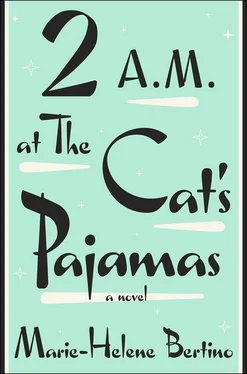Baby, here I am, by the railroad track!
Max motions for the others to stay on the same tip. The tomato is going to try it.
Madeleine is singing!
The caramel apples do not concern her. Her roachy apartment does not concern her. The young guitarist does not concern her, though she senses he is moving his music over and under her singing. The thorny issues of her particular life do not concern her. Even her mother. The only thought Madeleine has is, when she is singing, singing. There is only the way the song feels in her throat.
Waiting for my baby!
In a white room lit by a white candle, Madeleine is the white candle. Madeleine is the white room. Born perfect from her perfect mother and fucked up by her fucked-up father, one holy, catholic, and apostolic song. It is the rest of her life rising to meet her like heat from the sidewalk and she knows it like she knows to take the A train when you want to find yourself in Harlem.
He’s comin’ back!
She sparkles, she goddamns, when it’s time for the highest note, she gathers the reins of her diaphragm and soars. Even the musicians doff their impassive expressions. The song is over and everything around Madeleine gets loud with applause, yet somehow she hears the young guitarist say, “What’s next, little girl?”
Madeleine calls out the song like she’s done it countless times, like she and he have a routine they’ve hammered out in late-night venues. Madeleine calls out “Blossom’s Blues,” then immediately regrets it. No one knows Blossom Dearie except her dead mother who would make her dead too if she caught her here, but Madeleine’s self-lecture is interrupted by the first chords of “Blossom’s Blues” and if she keeps berating herself she will miss her—
My name is Blossom, I was raised in a lion’s den .
My nightly occupation is stealing other women’s men .
It is Christmas Eve Eve and Madeleine is singing on a stage and you can shove your caramel apple up your ass, Clare Kelly.
“You hear the one about the talking dog?” Lorca says. He and Mongoose are in the hallway, walking back to the bar. “A man and a dog walk into a club. The man says to the club owner, ‘This here is a talking dog. We’ve just come from Europe where we killed every night, so you have to give us a gig.’ The club owner says sure, but he’ll have to test the dog. ‘You’ve just come from Europe,’ he says to the dog. ‘How was your trip?’ The dog says, ‘Ruff!’ The club owner nods. ‘How was the flight?’ he says. The dog says, ‘Ruff!’ The club owner thinks a minute. ‘What were the headlines of today’s paper?’ he says. The dog stays silent. ‘See here,’ the club owner says, ‘tell me what the headlines were on today’s paper.’ No dice. The dog doesn’t answer. The club owner kicks them out. They go home and the man is furious. He screams at the dog, ‘Why did you not tell the man what the headlines were on today’s paper?’ And the dog says, ‘You know damn well I can’t read.’ ”
Mongoose snorts, nods. Then he lifts his chin, listening. “Who’s that singing, Lorca?”
They muscle through the standing crowd. Onstage a young girl (eleven? twelve?) is singing. “Christ,” Mongoose says. “Child labor.” Then, impressed, “She’s tearing it up.”
This girl isn’t tall enough to see over the audience. Alex jags in and out of her runs. He stomps his foot and guffaws toward Gus. He seems to be unable to stop smiling. Something about the facility of his wrists flexing over the fretboard. Something about his upturned face. Lorca sees his son the way a stranger would who happened in from the street, and realizes there can be no life for his son other than the one music will make for him.
“We have to stop them.” Sonny’s eyes are panicked. “It’s two A.M. Christ, Lorca. Wake up.”
Sonny is right, but Lorca doesn’t intervene or even move toward the stage. He listens to his son play, and a feeling settles over him that is at once so whole, so undeniably itself, it has to be joy.
Ben places his lips against Sarina’s. She raises her chin to make it easier for him. It’s more of a press than a kiss. A place marker.
The feeling at the base of Sarina’s stomach is akin to the promise of snow. Ben releases her but does not move away. Sarina touches her bottom lip for reference.
Madeleine is singing.
Principal Randles sits in a booth by the window, her will climbing and falling against the cage of her decorum. Something about this girl and her song is so rapturous, so influential, that even the tax attorney begins to move the lower half of his body. She will not cause a scene. She will not rise up from where she sits. It will not be the Winter Assembly again. But then the girl hits one pure note that shimmers into vibrato and the principal’s dominion over her actions slips. She’s standing, but she will not leer over the table. Fine, it is permittable to leer if only his attention stays on the stage. But the tax attorney, twitching with rhythm, feels her movement behind him. How can she explain? How can she battle the urge to hold him? She will say a cheerful remark and sit back down. She cannot think of a cheerful remark. The girl alights into an array of short notes, each one hammering a rib in the principal’s rib cage. The tax attorney’s cheeks are the color of sheets she can’t afford. Three thousand thread count. She clutches at them. She will not put her tongue on him. She will not put her tongue on him again. He tries to shake her grip with a stilted laugh.
She will let him go. After this lick. After the next. But his skin tastes like olives and she loves olives. She takes unhurried, indulgent licks.
It is the Winter Assembly again, only this time instead of mauling Kevin, the unfairly muscled janitor, she mauls the tax attorney, who under “Special Interests” on his profile wrote, Your wok or mine?
Release him , she begs herself. He is openly struggling. But her ancestors were electricians and plumbers. She can devastate chestnuts in her grip. She moans into his ear. The tax attorney bats at the ground with his feet. People at other tables gape. She cannot stop, dear God let me stop, she cannot stop. She drags her tongue from the base of his chin to the corners of his petrified eyes.
The world is fair tonight, so fair that Madeleine is filled to her ears with fairness; it is fair, fair, fair. She prances back and forth on the stage, delivering this line to that person, and that line to this. The audience looks delighted except for this man who has pounded onto the stage and is cuffing her forearm past the point of fairness.
Madeleine recoils.
“Attention everyone,” the man says. No one listens. The man “Attentions” again.
His gruff words do not match the gentle disposition of the audience. The guitarist stops playing and the drummer stills. The cheering subsides.
It is Len Thomas, flanked by plainclothes officers.
“What time is it?” Lorca says. A cursory survey of the club tells him it is over capacity by roughly seventy-five people. A musician onstage is smoking. He is smoking. It is past two A.M. A minor is singing. In addition to the fine he already owes, who can imagine what kind of improbable debt is being calculated on the notepad of Len Thomas.
“This club is being closed by order of the city. Everyone is expected to leave immediately except those I will keep for questioning.”
Madeleine shakes the man off. She has nowhere to go but into the bank of people who part as she jumps. They clog her running path. She counters, jockeys, double jockeys. Who are you who is that who was that? Toward the tonsil of pale night that peeks into the club at every entrance or exit through its heavy doors, Madeleine runs and Madeleine runs.
Читать дальше












